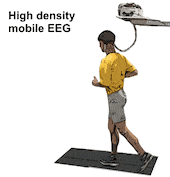
Understanding how the human brain controls locomotion is a considerable neuroscience challenge that has required advancements in mobile neuroimaging methods. Mobile high-density electroencephalography (EEG) allows electrical brain activity to be measured non-invasively during gait, but these signals are prone to contamination from physiological, mechanical, and electrical artifacts during movement. Eye movements, electrical muscle activity, and motion induced noise can compromise EEG signal quality and undermine interpretations regarding sensorimotor electrocortical dynamics during gait. To overcome these challenges, we applied our novel dual layer mobile EEG recording methods for artifact removal to study changes in human electrical brain activity across a range of slow and fast walking speeds. By leveraging a secondary layer of mechanically coupled and electrically isolated recording electrodes, we were able to both document and remove movement induced artifacts from human scalp EEG recordings. Using this approach, we evaluated traditional and novel signal processing methods for EEG artifact removal to recover gait related electrocortical spectral power fluctuations that were tied to contralateral lower limb gait dynamics. At faster walking speeds, spectral power fluctuations from sensorimotor cortex were less pronounced throughout the gait cycle, and alpha (8-13Hz) and beta band (13-30Hz) spectral power decreased relative to slower walking. Applying comparative signal processing methods to our dual layer EEG hardware presented similar intrastride sensorimotor spectral power fluctuations, but novel dual layer EEG signal decomposition techniques more clearly uncovered gait speed related spectral power decreases during faster walking. Reduced sensorimotor alpha and beta band spectral power could relate to increased sensory processing at faster gait speeds for performing sudden locomotor adjustments.

